Sustainability
exeter.ac.uk/sustainability

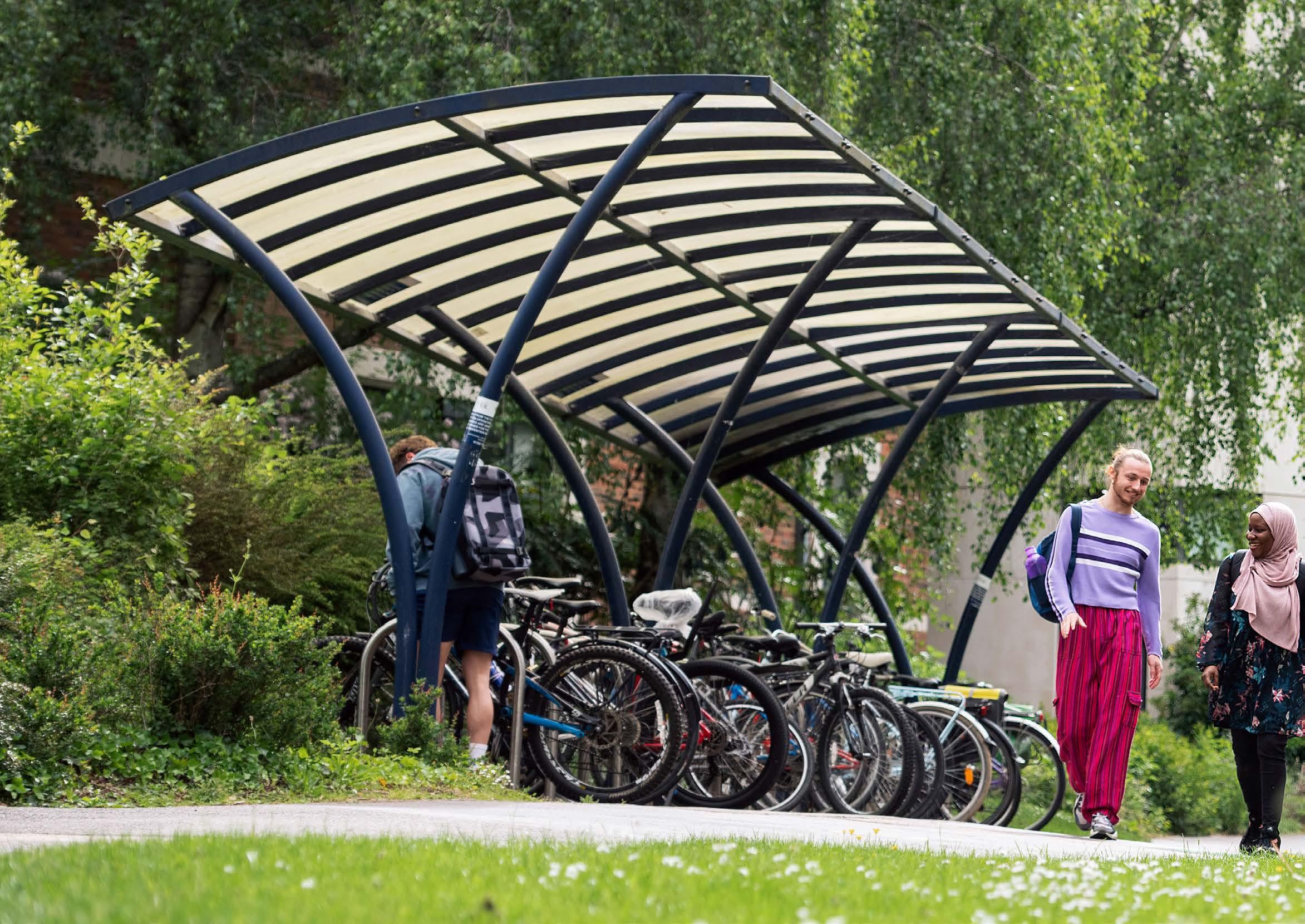


exeter.ac.uk/sustainability




Welcome to the University of Exeter’s Annual Sustainability Report 2022/23. We are proud that this year we have continued to make great progress in our commitment to lead meaningful action against the climate emergency and ecological crisis. This is one of our key Strategy 2030 goals, and a task to which we remain absolutely committed.
This report summarises the excellent ongoing work to reduce the impact of our operations, across our faculties and professional services divisions. It highlights how our outputs, such as our research and education activities, are focused on providing solutions for a greener future, whilst also enabling us to continue to grow as an institution.
Our activity in this area is having an enormous impact around the world. Our presence at COP28, including our work launching both the Global Carbon Budget and the Global Tipping Points Report, helped inform governments and policymakers at the highest level. We also launched Green Futures Solutions in 2023, to help businesses and organisations to transition to net zero sooner, make smarter use of natural resources, and seize opportunities in growing the green economy.
The IPCC have once again highlighted the need to make fundamental changes to the way we all operate, if we are to preserve our environment and prevent climate breakdown. Time is ticking, and it is more important than ever that we mitigate our contributions to climate change and environmental damage, so that we can protect future generations.
To this end, we are looking at this issue in a holistic way, and have made progress to reduce our impact beyond just greenhouse gas emissions, with University strategies emerging to tackle biodiversity loss and water consumption, as well as ensuring that all areas are considered as we move to operations with a far lower carbon footprint.
It of course remains imperative that we measure the impact of our growth accurately, and we recognise that as we move forwards we will need to overcome further sustainability challenges as they continue to emerge. This year is also the first in which we are reporting on an emissions footprint that is greater than our baseline comparison year, which has been taken into account when recording progress against our commitments.
I’d like to take this opportunity to thank all our students, colleagues, and external stakeholders for their continued efforts in helping us to reach our ambitious sustainability targets. I remain proud to lead an institution so dedicated to tackling one of the most pressing challenges of our time, and I am confident that by working together, our University can achieve great things in our quest to forge a more sustainable world.

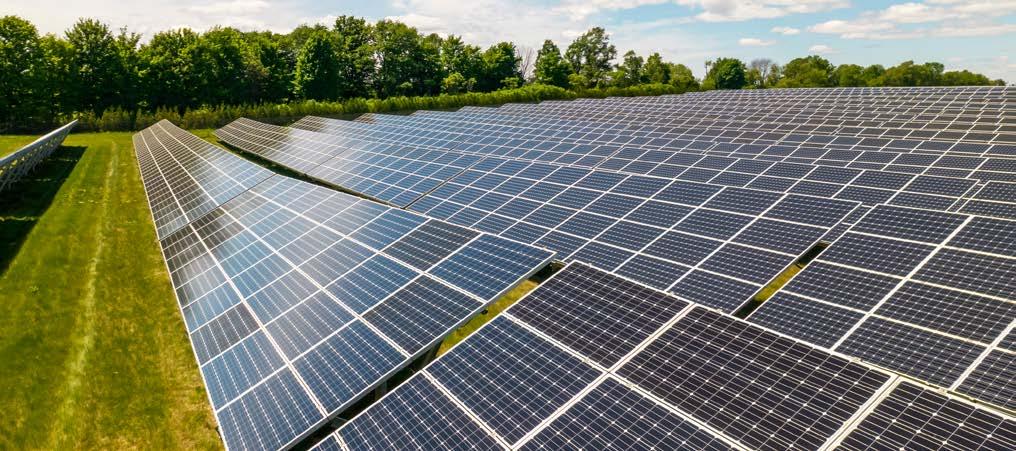
The University has set an ambitious target of achieving net zero across all three scopes by 2030. This requires a coordinated effort by all areas of the institution, from operations to outreach, education to engagement. This annual report provides a year in review of sustainability activities from 1 August 2022 to 31 July 2023 and reflects the work that has been taking place to both reduce the University’s carbon emissions and demonstrate broader leadership in the sector and among stakeholders.
Thanks to activities such as the installation of solar panels and heat pumps, upgrades to electrical systems and infrastructure, and a focus on energysaving behaviours, the University emissions from direct sources (Scope 1) and indirect sources (Scope 2) have decreased by 10% since 2018/19. Most of our Scope 2 emissions are market-based emissions using green tariffs, and the reduction is mainly due to lower gas consumption. Specifically, gas-related emissions have decreased by 8% compared to the baseline year.
Across the estate, the University’s Sustainability Design Guide is ensuring that new capital projects achieve Passivhaus status, while we are decarbonising and improving some of Exeter’s oldest buildings to EnerPHit guidelines. A nature-positive approach to the campus grounds in both Devon and Cornwall is also driving biodiversity improvements across the estate.
A focus on reuse and recycling has helped to reduce landfill waste by 82%, and an overall waste reduction by a mass of 37%. Travel behaviours have been complex in recent years following the response to the Covid-19
pandemic, but business travel has seen a bounce back this year, whilst staff commuting has seen reduction due to a revised hybrid working policy.
In procurement, a wide range of strategic initiatives contributed to an emissions intensity reduction across our supply chain of 7%. However, due to increased expenditure, net inflation since our baseline year and reliance on a spend-based methodology, our reported emissions for bought goods and services increased by 24%. The University is addressing all areas of our supply chain, prioritising high impact areas across Hard FM, Soft FM, Professional Services and IT.
Embedding sustainability in its education provision is vitally important for the University as it seeks to prepare its graduates for the challenges and opportunities that await them as globally-aware citizens. That is why the institution is supporting a raft of innovative pedagogic, curricular and extra-curricular initiatives to promote sustainable best practice, and grant access to best-in-class careers and skills development activities.

In research, the University’s academics continue to deliver globally impactful projects that are helping the world to become greener, healthier and fairer. But the institution is also working to ensure that the way in which that research is conducted – and the laboratories where some of it is based – is more sustainable.
All these activities are helping to power Exeter’s success in influential national and international league tables. In the Times Higher Education Impact Rankings 2023, Exeter ranked 18th overall, and secured 1st place globally for SDG 6: Clean Water and Sanitation. It ranked 1st in Europe for SDG 13: Climate Action, and was 1st in the UK and 2nd in Europe for SDG2: Zero Hunger, among a string of outstanding results.
The University’s global standing is also evidenced by its commitment to climate leadership. The University was well-represented at COP27, where senior leaders and researchers attended the global summit to engage with policymakers and lead several high-profile sessions. There were important contributions to key reports by the IPCC, and the launch of the annual Global Carbon Budget, with a UN press conference.
All of these highlights, and many more, are featured in the course of this annual review.
Exeter ranked
18th
In the Times Higher Education Impact Rankings 2023
Environmental Sustainability is formally reported on an annual basis to Council, the Climate and Environmental Crisis (CEC) Board, and the Environment and Climate Emergency (E&CE) Dual Assurance. The CEC Board is the University’s senior governance group responsible for setting policy and priorities, maintaining oversight and approving the resource and delivery programmes for the E&CE response across the University.
Joint chaired by the Senior Vice-President and Provost, and Senior Vice-President and Registrar & Secretary, the CEC Board meets termly and provides a policy and decision-making forum to ensure delivery and continual improvement of activities and operations across the University to meet the Strategy 2030 commitment to lead meaningful action against the Climate Emergency and Ecological Crisis.
Membership of the Board includes academics, student representatives, the Director or Estate Services, the Director of Sustainability, and representatives from Procurement, Communications and Marketing, plus others as appropriate.
Click here to see our governance diagram.

Environmental data and reporting is critical to addressing high impact areas, helping us to determine where resources should be focused, demonstrate performance to stakeholders and learn lessons for continued improvement in our approach to carbon reduction and environmental protection. Our greenhouse gas (GHG) emissions are reported in line with the GHG Protocol Corporate Standard.
The University’s GHG emissions have risen by 17% since the 2018/19 baseline year, to a total of 96,266 tCO2e. Much of this is due to reported emissions associated with our bought goods and services. This scope 3 category makes up 60% of our total footprint and has seen a 24% increase since baseline year. It is important to note that this category is calculated via a spend-based methodology, where emissions intensity values are applied to our spend data to estimate the likely emissions associated with our activity. Whilst our emissions have risen by 24%, our inclusive expenditure rose by 33% across the same period. Emissions have risen to a lesser extent than our expenditure because our emissions intensity, tCO2e/£, has reduced by 7%. This is a sign that the University is operating more sustainably than it was during its baseline year, and reflects efforts to procure more responsibly, and it also highlights why efforts to decarbonise our procurement remain a priority for the University of Exeter.
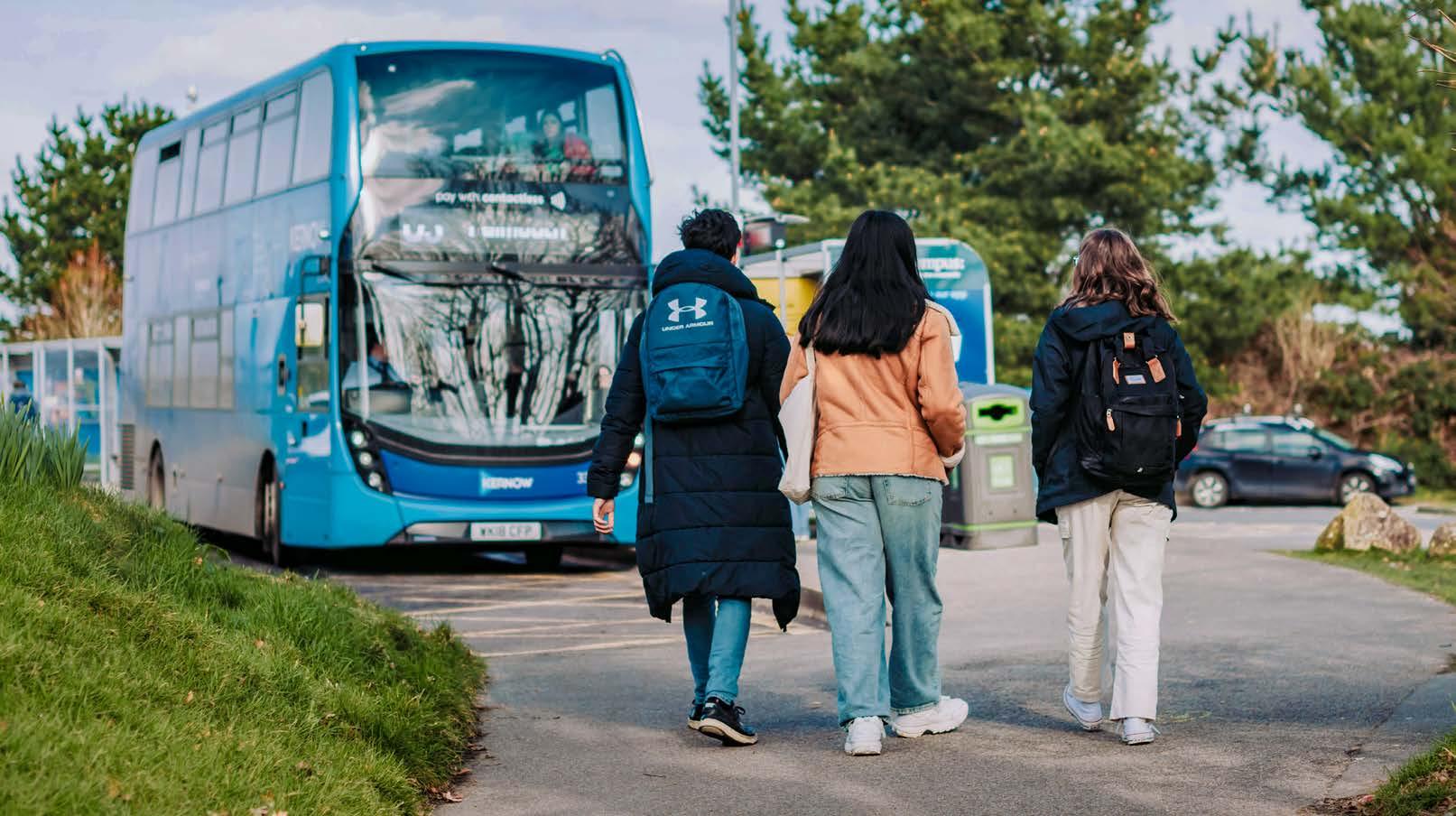
Despite significant reductions in travel activity and emissions over the last few years, missions associated with travel have increased to pre-pandemic levels; rising by 12% since the baseline year. Emissions associated with staff commuting have reduced, and increases in business and research travel emissions will be reviewed to identify opportunities to reduce emissions in future years.
Scope 1 and 2 greenhouse gas emissions associated with direct fuel consumption and electricity consumption have reduced by 10% since 2018/19. This is due to efforts to move away from fossil fuels for building conditioning, national grid decarbonisation, and significant efforts to increase renewable generation, which has increased by 324% since baseline year, to 663,258.38 kWh generated.
Waste and water each contribute less than 1% to the total footprint, but have seen respective emissions reductions of 42% and 63%. Consumption data is being used to inform the University’s impact reduction strategies associated with waste and water as it looks to limit the environmental impact of its operations, using metrics beyond just GHG emissions to measure it’s progress.
The following list of KPIs are used to report our sustainability performance:
The following list of KPIs are used to report our sustainability performance:
Scope 1 accounts for emissions created directly by the University, such as the burning of fuel in buildings and through its fleet of vehicles.
Scope 2 emissions are indirect in their nature and relate to where the energy purchased by the University is produced. Switching to 100% renewable energy suppliers might be one of the ways that an organisation could reduce its footprint under this scope.
Scope 3 emissions occur up or down the organisation’s value chain and this indirect nature can present a greater challenge when attempting to decarbonise. Typically, scope 3 emissions account for between 60-80% of an organisation’s total footprint, and arise from activities that are not necessarily directly controlled by the reporting organisation, presenting a big challenge centred around behavioural and cultural change to achieve decarbonisation. Waste, water, transport and travel, investments and procurement all contribute to the University’s scope 3 emissions.
After the EAUC published the Standardised Carbon Emissions Framework, UK universities now report emissions from student travel between permanent and term time addresses. The University is well aligned with the sector on emissions reporting to adopt a robust travel survey response from its student body with the intention of including it in the reported emissions footprint from 2023/24.
It is estimated that out of term time student commuting resulted in approximately 49 ktCO2e in the year 2022/23. This is a significant impact on the climate, and the University is committed to understanding how decarbonisation can be achieved in this area to mitigate risk against not achieving our net zero target.
Scope 1 and 2 emissions can be reported as either location-based or market-based in line with the GHG Protocol. Location-based reporting takes the total consumption across these categories and applies the UK average conversion factor across each fuel type, published by the UK government each year. Market-based reporting allows for consideration of the purchasing of renewable energy that is backed by Renewable Energy Guarantee of Obligation (REGO) certificates allowing organisations to demonstrate best practice regarding utilities procurement. The University reports on location-based and market-based emissions in line with the GHG Protocol.
In 2022/23, the University worked strategically in assessing its developing estate to best support a low carbon energy supply. Projects can take years to scope and implement, particularly as they must respond to the changing needs of the institution. This involves significant engagement with suppliers, partners, and the National Grid. For example, the University has begun discussions with city partners over the creation of an Exeter City District Heating Network and is in discussion over a new renewable Power Purchase Agreement (PPA). Currently, around 20% of electricity is procured through a corporate renewable PPA, and the remaining supply is backed by REGO certificates to demonstrate confidence that energy is provided via renewable technology.
The University’s photovoltaic (PV) solar panel strategy has reduced reliance on fossil fuels. Introduced in 2020, three solar installations on Streatham and St Luke’s campuses cut the University’s carbon footprint by over 100,000 kgCO2e per year. Battery storage is now being explored due to National Grid export constraints.
Hundreds of PV solar panels have been installed at key locations, such as on the Harrison Building at Streatham Campus. With an estimated output of 212,591 kWh per year, these panels at Harrison will save 45,282 kgCO2e annually. Research England has provided funding for an additional installation on the Centre for Resilience in Environment, Water and Waste (CREWW) project, as part of the effort to achieve ‘Net Zero in Operation’ status. PV solar panels have also been installed on the new Creative Quadrant building, which was opened in the heart of Exeter Business School in early 2023.
The Capital Strategy is at the heart of the University’s green evolution focusing on reducing scope 1 and 2 emissions. This year, it laid the groundwork for further developments, primarily through solar and wind power. For example, plans to install ground-mounted PV solar panels on University land close to the Duryard Halls of Residence were approved following public consultation and application to Exeter City Council. This development will see around 2,000 panels installed in the northern field, generating enough electricity (one megawatt) to power the equivalent of 200 domestic homes, saving 202,000 kgCO2e per annum. Projects are also underway to install roof-top PV solar panels at Pennsylvania Court and the University’s Tennis Centre.
Air source heat pumps offer another form of green technology. Byrne House presented the first opportunity for the University to explore this, and has had a heat pump installed as part of efforts to move away from sources that use fossil fuels. Work is now underway on a similar conversion for Cornwall House and the Biosciences greenhouse.
Build Solar Ltd – an innovative spinout company launched by University researchers – was awarded more than £300,000 this year to further develop new technology that helps convert solar energy to electricity without the need for solar panels. The company received funding from the government’s Net Zero Innovation Portfolio to help commercialise its patented glass brick, Solar Squared. These innovative bricks collect solar energy while being seamlessly incorporated into the fabric of the building.
Waste and resource management is a visible aspect of Sustainability. From the ability to recycle to the choice to not purchase in the first place, everyone has an impact.
The Sustainability team in conjunction with Commercial, Residential and Campus Services (CRC) implements the strategy around waste and has, over recent years, embraced the principles of the circular economy. This has driven engagement with projects such as Warp It the University’s reuse platform that enables staff to give and loan surplus assets across the organisation. There were nearly 300 ‘transactions’ last year, and it has now been opened to external organisations with charitable status, such as local education trusts and the SW Ambulance Service. The University also worked with community partners to recycle and donate more than 1,000 duvets and pillows to children and adults in need across both Ukraine and Exeter, preventing the items being sent to landfill. In partnership with Turntable, an Exeter-based charitable organisation that collects donated furniture, electrical items, and housewares, that are in a good, clean condition, to pass on to families and individuals on very low incomes, a donation of more than 200 duvets and pillows will find their way to people in need in the city.
The University’s decade-long partnership with the British Heart Foundation and its Moving On project saw students donate more than £46,000 worth of unwanted items. Running from May to September, every year, Moving On enables students to use donation points within halls of residence and on campus to give items that are in good condition that they would otherwise throw away. In 2022/23, more than 26 tonnes of unwanted items were donated and diverted from landfill.
In 2022/23, CRC introduced glass recycling to Streatham and St Luke’s, food waste recycling in self-catered halls, and full recycling options into the public area of the Quad at St Luke’s Campus for the first time. Future progress within waste and resource management will seek to move even closer to a circular economy, progressing towards a zero waste operating model to significantly increase re-use.
With 30,000 students and 6,000 staff, the level of emissions generated by the community travelling to the University is one of the most significant elements of its carbon footprint. It also requires collaboration with external partners to improve, especially relating to public transport and encouraging people to leave their cars at home.
Stagecoach operates the UNI bus service, which connects Exeter’s two campuses to the city centre and its transport hubs. The 2022/23 contract improved service frequency to every 20 minutes, doubling staff ridership and increasing total passenger numbers by 55%. Reduced complaints and increased usage will guide future service expansion discussions with Stagecoach.
Encouraging staff and students to use their bikes for commuting is also an ongoing focus. The success of the Co Bikes programme saw more than 7,000 journeys per month recorded in March 2023 – up from 1,500 – showing demand for such a sharing system. However, Co Cars Ltd, fell into administration in July 2023, so the University is now talking to Devon County Council to tender for a new supplier. The Sustainable Transport team is in discussions to create new ‘bike hubs’ around campus, which would offer secure, swipe-access storage for cyclists, as well as changing space and clothes drying facilities.
The 2022/23 contract improved service frequency to every 20 minutes, doubling staff ridership and increasing total passenger numbers by
A new Sustainable Transport Plan is in development and is expected to be finalised in 2024, informed by the staff and student surveys sent out in spring 2023. The survey revealed that single occupancy car trips fell from 38% to 30%, and a new ‘lift-share’ platform has recently been introduced, which should reduce occupancy car trips further which will help focus a new ‘lift-share’ platform to be introduced shortly. With 87% of students choosing to walk to the University, there are discussions with Devon County Council over its Walking and Cycling Transport Plan and its impact on the institution.
The Centre for Future Clean Mobility – a pioneering new facility, designed to develop greener transport – opened last year at the University’s Engineering Research Centre at Exeter Science Park. The centre, funded by a £2 million grant from the Heart of the South West Local Enterprise Partnership, will work with businesses to develop low-emissions, highefficiency integrated power systems for applications in the marine, off-highway, rail, defence, and energy sectors.
Water accounts for less than 1% of the University’s total emissions footprint, but is recognised as a vital resource that must be consumed efficiently. This scope 3 contribution has seen a 63% reduction in emissions since the 2018/19 baseline, largely due to industry decarbonisation associated with water treatment and supply. Water consumption across the estate has increased by 3% due to University growth during this period.

The Centre for Water Systems has been working on two new projects designed to bolster research and education within the water sector. With £450,000 in funding from Horizon Europe, CWS has commenced work with academic and industry partners on WATERLINE and WATERVERSE, which will support the training of future water researchers and engineers, and enhance the management of water services.
Procurement represents 60% of University emissions. There is significant focus on working with suppliers to ensure that their processes are sustainable. Our reported emissions in this category are currently heavily reliant on a spend-based methodology, where conversion factors applied lag behind reporting years by three years. This means they carry weaknesses associated with inflation and cost variation, and are not always appropriate for demonstrating specific sustainable practices. The University is committed to moving towards best practice with regard to its emissions reporting, and has been significantly increasing efforts to collect supplier-specific data, and understand where it can adopt activitybased reporting. During 2022/23, there has been a significant theme of supplier education and engagement, led by the Strategic Procurement team, working with both external suppliers and bodies to understand the current maturity of our supply chain regarding sustainability.
In the last 12 months, the team has begun to embed 20% weighting for sustainability into tenders, with the UN SDGs acting as the foundation for that element. This covers all its procurement categories: ‘soft FM’ (catering, retail, fleet etc.); ‘hard FM’ (construction, maintenance, utilities); IT; and Professional Services.

The Strategic Procurement team is also dedicated to addressing social value, and has reviewed the Social Value Portal – a national reporting system – with the aim of rolling this out fully next year. The University of Exeter will be one of the first universities to do this, and there is potential for this to be opened to other teams within the University, thus enabling the institution to capture a total social value figure.
Stakeholder and supplier engagement is critical to this bought goods and services decarbonisation, and as such, the Procurement team has orchestrated a range of initiatives that bring together the supply chain into different fora of conversation. The biggest is the annual supplier day held in April, which in 2023 (the second of its type), drew more than 550 suppliers and provides an opportunity for conversations around key challenges such as social value and circular economy. The team also launched a new webinar series in October 2022, kicking off with a webinar focused on carbon accounting, which has led to partnerships with EcoVadis and Net Positive Futures to support our supply chain in decarbonisation.
Investing in the estate and ensuring that its facilities meet the demands and expectations of our community is a key element of the University’s strategic operations. Construction remains one of the most carbon-intensive areas of any organisation, and particularly so for those institutions who maintain an ageing estate.
To help achieve its zero carbon targets, the University adopts Whole Life Carbon (WLC) Assessments for all capital projects. Through WLC Assessments, it considers the lifetime consequences of design decisions, and promotes durability, resource efficiency, reuse, and future adaptability, all of which contribute to lifetime carbon reductions. To facilitate this, the University introduced the Sustainability Design Guide framework in 2021, which guides all decisions on sustainable design and construction, from the flagship of capital new builds, to the smallest refurbishment of an existing building. This commits the University to consider the Passivhaus standard on all new builds as a minimum, and EnerPHit standards on all refurbishments and fit outs.
The proposed new West Park student accommodation is one of the first capital projects to be launched under the guidance of the Sustainability Design Guide and on completion is forecast to be the largest Passivhaus student accommodation development in the UK. Other projects being informed by the guide include the Multi-Faith Centre which is under construction at the Streatham campus, and an extension to the ESI building in Penryn, which will see the creation of the first certified Passivhaus labs in the country.
The year 2022/23 saw huge progress made on the construction of the Centre for Resilience in Environment, Water and Waste (CREWW) on Streatham campus and work was completed in August 2023. The construction was in partnership with South West Water (SWW), and was part funded by a grant from Research England and investment from both partners. It is the first purpose-built, transdisciplinary research centre in the water sector, focusing on the most pressing challenges that impact upon the provision of safe and resilient water and waste services in the UK and overseas. Though the building pre-dates the Sustainability Design Guide, it will be carbon neutral in operation thanks to a network of PV solar panels.
The University has adopted a Nature Positive approach to biodiversity. This was enshrined in December 2022 when it became a member of the new Nature Positive Universities Alliance launched at the UN Biodiversity Conference in Montreal. As a member, the University is committed to halting, preventing and reversing nature loss by addressing its own impacts, and by restoring any ecosystems harmed by its activities. The Sustainability team is now developing a Nature Positive Strategy to drive this forward, and will collaborate with partner universities, who span 48 countries, to share findings and best practice.
Biodiversity is a defining theme when it comes to the University’s estate, across campuses in Exeter and Penryn. This estate is an intrinsic element of the University’s brand and identity, and the experience it offers to its students and staff. From the 10,000 trees, magnolia lawn and cherry orchards of the 300-acre Streatham Campus, to the sub-tropical trees, lime avenue and historic rare rhododendrons on the 100-acre Penryn site shared with Falmouth University, the green spaces that frame our home have earned national acclaim and accreditation. They are also prime habitat for a wide variety of amphibians, birds, insects, mammals and reptiles, creating a diverse system of ecological niches. Both sites, along with the genteel St Luke’s, are multi-year recipients of the Green Flag, the UK’s benchmark standard for the management of green spaces and are cultivated by expert Grounds teams employed by Exeter and FXPlus.
This year, the Grounds team in Exeter has introduced several changes to the way it manages areas of habitat across the two sites to support biodiversity and reduce its own carbon footprint. For example, it is allowing several areas of grass in prominent areas of Streatham Campus to grow longer for an entire year as a trial to investigate both its impact on the ecology and aesthetics of the area. And when it comes to grass cutting, it has reduced its use of engine-powered mowers by purchasing several autonomous electric mowers, including one specifically for the sports pitches at Topsham. This is estimated to save around 1,000 litres of diesel per month. In addition, all hand machinery, such as strimmers and hedge cutters have been replaced with battery-charged versions. A new grass baler has also been purchased to remove grass cuttings, which again, improves biodiversity.
For the past decade, the Grounds team has proudly produced no green waste, and has this year further reduced impact by taking key services in-house, reducing the need for contractor travel. A new technique with the management of trees that are found to be ill or damaged has been adopted to ensure vital habitat and ecosystem services are not removed unnecessarily, and instead Exeter’s arborists are ‘veteranising’ those found to be in ill-health, such as ash trees afflicted with die-back, by using special techniques such as coronet pruning, or cutting a wedge from the trunk, packing the cavity with soil and then replacing the wedge to seal in the microbes.
The future of Lower Hoopern Valley has also been in focus this year. The 38-acre area to the south of Streatham Campus has long been regarded as offering great potential for biodiversity, student learning and public engagement, but has suffered from elements of antisocial behaviour in the past. In addition to an online feedback process, this year saw the staging of a campus exhibition where the public had the opportunity to talk to the project team about the future of the site. The feedback received is currently being reviewed, which will help to inform a 25-year management plan.
At the Penryn Campus, large areas have become richer in biodiversity, thanks to reducing mowing regimes, sowing wildflowers and managing woodland and hedges carefully. Orchids are springing up in the unmown grass areas and these are a sign of a diverse and healthy sward.
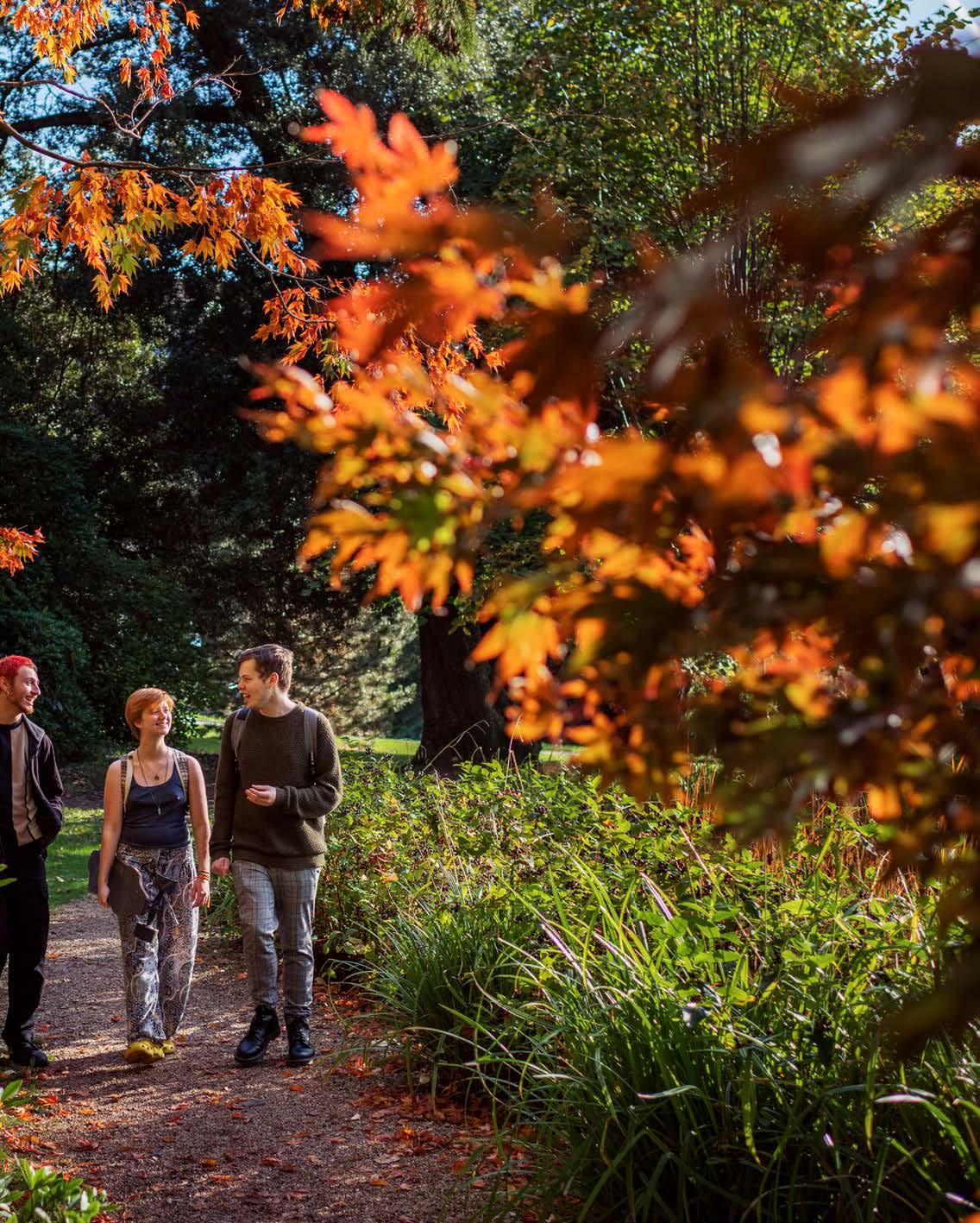
The University Catering and Retail Services Team is a flagship for sustainability and maintains a clear public commitment to reducing its carbon footprint. This is embodied in its Sustainable Food Policy and Action Plan, which covers sourcing, such as promoting locally sourced produce from suppliers who meet sustainable and ethical criteria and accreditation; environment, including the reduction of plastics, packaging and the consumption of ruminant meat; and society, including greater consumer information, better showcasing of seasonal produce and engagement with staff and students.
From this plan, the Catering and Retail Services Team has established eight initiatives that it works towards, against which it measures its progress annually. Drawing upon behavioural science and pricing architecture, the initiatives (like the overarching plan) are founded not upon a reduction in choice, but on providing more information to students, staff and visitors to enable them to make more informed and conscientious decisions. This includes adding carbon footprint information to meals, operating a ‘meat-second’ approach to menus, and imposing a 40p levy on disposable cups.
With the return to full campus operations in 2022/23, the team has set about establishing a new baseline for its operations, using a dashboard to analyse key metrics that align to the initiatives. These include the percentage of vegan meals sold, the ratio of dairy versus non-dairy in drinks sold, and the number of drinks transactions using reusable cups.
THIS YEAR:
12,756 litres of plant-based milk were used (10.6% of milk).
103,209 vegan and vegetarian meals were sold and served across the estate’s licensed premises, retail catering outlets and within the residences (31.4% of meals).

48.5% of all hot drinks served were served in a reusable cup, a 13.4% increase from the previous year.
There has been a reduction in the amount of meat served across areas, including a decrease of 6.5% at the Ram Bar; 9.2% at Cross Keys; and 7.6% at La Touche.
During Veganuary in January, the team served a total of 5,783 Vegan meals within retail catering outlets – just under half of the entire monthly total.
One of the key successes during 2022/23 has been the establishment of a ‘garden kitchen’, working in collaboration with the Grounds team. Using both traditional planting and a hydroponics system, the kitchen will grow fresh produce year-round, which will be used in the University’s menu, including herbs, salad, seasonal vegetables, beetroot and strawberries. The facility was trialled during term 3 and will be scaled up over successive years – with members of the catering team advising on which produce the growers should focus on.
The University’s world-class research makes a powerful contribution to the sustainability landscape, across a multitude of fields. Whether it’s climate and earth systems, ecology and conservation, environmental intelligence and monitoring, or clean growth and business practices, researchers across the institution are working towards that greener, healthier and fairer future. In this section, you will find just a few examples of that work.
But how the University conducts that research is also of fundamental importance, especially when those activities impact upon emissions or biodiversity. And that is why the Sustainability team is supporting researchers to help them to understand the impact of their work on the University’s own footprint, and to help them to adopt greener approaches.
One of the most innovative ways it is doing this is through a new Research Footprinting Tool, which has been developed in-house by research software engineers to help identify areas of high impact within research activity. The tool enables academics to better understand which areas of their research activity lead to the highest GHG emissions, via an easyto-use interface that relies on readily available information. The results not only act as a discussion-starter for academics on the impact of their work, but also an entry-point into potential decarbonisation. The tool has undergone testing during the year and will be developed further with feedback from the academic community. And the long-term aim is that this could potentially be shared for the benefit of the higher education sector, as it is believed to be unique in UK HE.
Gaining an accurate picture of where emissions arise is vital when it comes to mitigating this impact, and the University is also making great strides when it comes to carbon accounting. All budgetary activity across the University – from the construction of a new building to an expenses claim for travel – is accounted for in its greenhouse gas emissions thanks to methodology developed by the Sustainability team and the academic community. A cutting-edge platform is now being developed by the Digital team that will enable the institution to obtain a much more accurate and nuanced understanding and make meaningful use of supplier-specific and activity-based data.
The University has played a role in supporting the UKRI to develop a sector-wide sustainability concordat, which seeks to advise research-led institutions on how to conduct sustainable research. The Concordat for Environmental Sustainability of Research and Innovation Practice will seek to obtain agreement from all organisations involved in research or innovation activities on immediate and consistent long-term action to reduce and eliminate environmental impacts and emissions associated with research and innovation.
Through the Research and Impact Strategy Fund, the team has also funded a pilot project for Technical Services staff and early career researchers to apply for funding to address sustainability issues in their laboratories. More than £24,400 was allocated to four projects initiated at a local level, all with potential for future scalability. Each has facilitated close collaboration between technicians, sustainability teams, and laboratory users.
SUSTAINABLE RESEARCH PROJECTS INCLUDE:
Reworked PPE Recycling a pilot project to establish a separate waste stream for single-use PPE nitrile gloves. This separation will enable these gloves to be repurposed or recycled, rather than being incinerated.
Plastic Recycling Scheme a project that will see the purchase of equipment that will enable the University to recycle unwanted 3D prints and support materials. These materials will be ground into pellets and transformed back into 3D printer filament or plastic sheets for reuse.
Fridge Replacement an initiative to replace outdated domestic fridges with communal commercial reagents fridges, thus reducing the likelihood of duplicate reagent purchases in shared laboratories.
Coolant Recycling Vacuum funding secured to buy a Coolant Recycling Vacuum to minimize the frequent replacement costs of coolant in workshop machinery and reduce waste disposal.
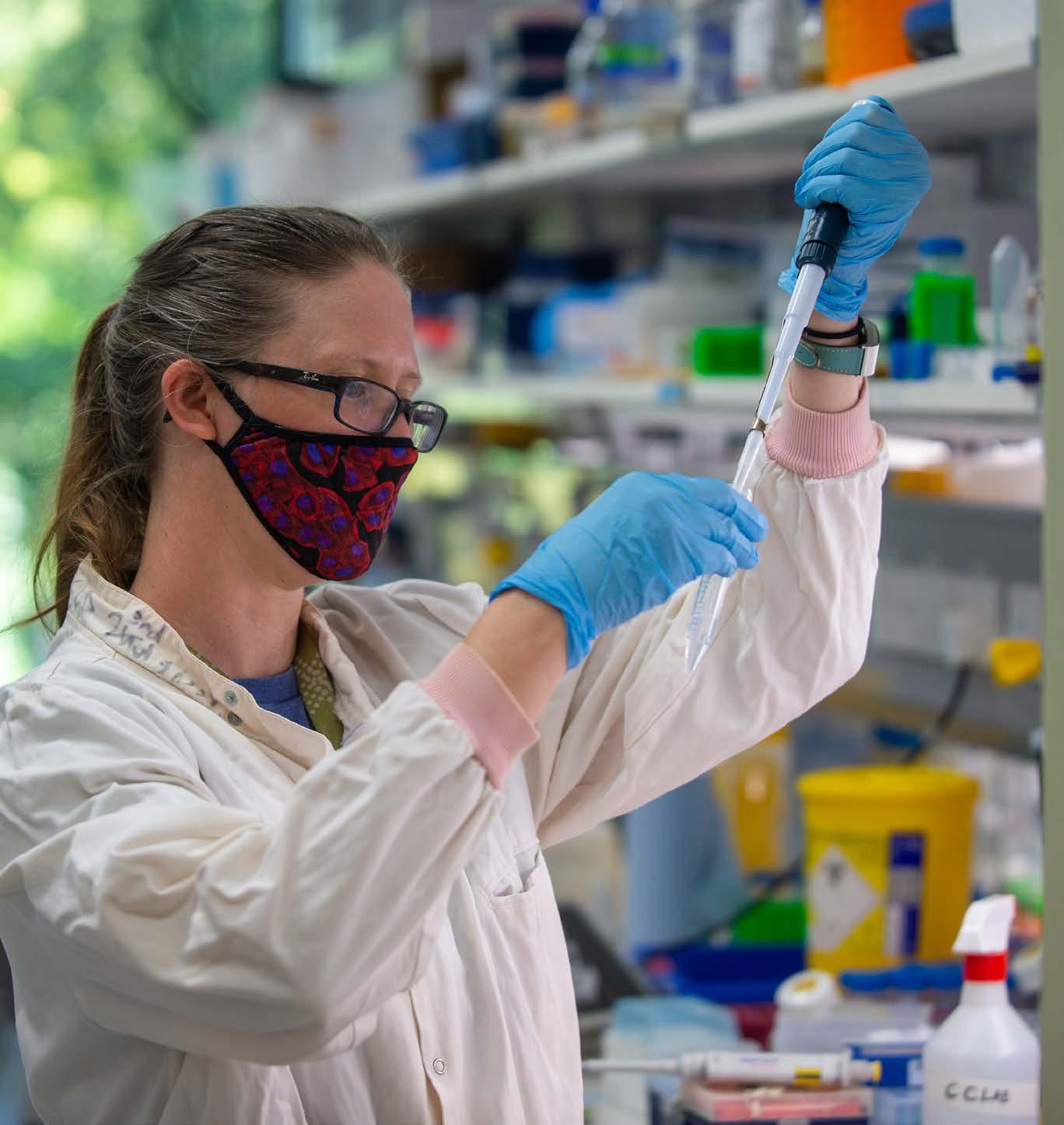
Laboratories are responsible for producing a significant percentage of a university’s carbon emissions. It is estimated that the activities undertaken in labs result in the consumption of up to ten times more energy and four times more water per square metre than other academic spaces. They also consume excessive amounts of plastic, with a 2015 study, published in Nature, estimating that they are responsible for generating around 2% of plastic waste worldwide. This is why Exeter is working to address these issues and minimise the negative environmental impacts of laboratory-based research and education.
In its E&CE Policy Statement, the University committed to implementing the Laboratory Efficiency Assessment Framework (LEAF) and to reduce Ultra Low Temperature (ULT) freezer points by ten degrees. Both of these commitments have continued to be successfully delivered during 2022/23.

An online tool, LEAF is designed to guide laboratories on reducing their environmental impact, spanning management of samples, chemicals, equipment, waste, ventilation, procurement and IT. It has been adopted by thousands of laboratories in more than a dozen countries.
In 2021, the University became just the second higher education institution in the world to achieve LEAF Bronze accreditation across the board. Individual laboratories within the University have used this status as a springboard to upgrade to Silver or Gold, which require sustainability priorities to be more deeply embedded at the research level. Of the 85 lab clusters registered, 25 now have Silver status, while five have progressed to Gold – the Environment and Sustainability Institute, Geoffrey Pope Biosciences Teaching Lab, Medical School Building Labs, Aquatic Facilities, and NC05 Teaching Labs. All remaining laboratories are now working towards Silver by the end of the coming year.
The Sustainable Labs team has supported this process by delivering webinars, resources and guidance to teams across the institution, covering all aspects of lab sustainability. Their work has included guidance on equipment usage and maintenance best practice, the twelve principles of green chemistry, lab plastic reduction, green algorithms, water usage, sustainable procurement, sustainable research design, and sharing of assets and chemicals. These resources are available via the Exeter Sustainable Labs website, SharePoint site, Microsoft Streams site and Teams group.
The team also assisted in the delivery of an equipment replacement fund to replace old drying ovens and ULT freezers (both top contenders for highest energy consumption in labs).
The University boasts a significant number of ULT freezers, which are vital for the safe storage of samples used in research. These freezers are typically set to –80°C, at which temperature they consume an equivalent level of energy to an entire domestic household. In the case of freezers, there is growing evidence to suggest that many can be kept at –70°C, which would represent an energy saving of up to 30%, offering contribution to both the LEAF accreditation and scope 3 decarbonisation.
To assist academics and technical teams in making an informed decision, the Sustainable Labs team has collated and shared scientific papers on the topic, as well as produced a literary review paper.
Sixteen out of the 30 lab clusters with LEAF silver or gold accreditation, have now increased the temperature setpoints of some or all their ULTs, with the remaining nine not having any ULT freezers within them. In some cases, this has seen labs collate samples that have to be stored at –80°C into a single unit to facilitate the raising of the temperature across the remaining units.

The 2022/23 academic year was another remarkable one for the University’s research standing. In the 2021 Research Excellence Framework (released in 2022 due to the pandemic delay), Exeter saw more than 99% of its research scored as of international quality, with 89% internationally excellent and 47% world-leading. And the University’s world-leading research impact grew by 72% since 2014, more than any other institution in the Russell Group.
Within the University, the likes of the Environment and Sustainability Institute (ESI), the Global Systems Institute, the European Centre for Environment and Human Health, and the Societies and Cultures Institute conduct powerful research that directly contributes to our ambition to lead on meaningful action against the climate emergency and ecological crisis.
Some of the highlights include:
• The launch of Green Futures Solutions, a new business support initiative to help companies reach net zero and seize opportunities in the growing green economy.
• The publication of a new analysis in Science that concluded that multiple climate tipping points could be triggered if global temperatures rise beyond 1.5°C
• The release of a new study from the Global Systems Institute warning that current climate policies will leave more than a fifth of humanity exposed to dangerously hot temperatures by 2100.
• The presentation of a new report at the World Economic Forum in Davos that concludes three ‘super-leverage points’ – relating to the sale of electric vehicles, the use of green ammonia in the manufacturing of agricultural fertilisers, and public procurement of plant-based proteins – could trigger a cascade of decarbonisation in major greenhouse gas emitting sectors.
• The launch of the Hoffman Fellowship on the poles, a two-year post in partnership with the World Economic Forum and science communications platform Arctic Basecamp.

• The publication of supporting research from the Greenpeace Research Laboratories at the University, and the University of Turin, showing that synthetic nitrogen fertilisers account for 2.1% of global greenhouse gas emissions.
• The expert support of the first Marine Protected Area in the Republic of Congo, and a sustainable aquaculture plan for Caribbean spiny lobsters.
• The publication of a paper in Nature warning that some ‘Green’ farming policies in the UK might accelerate global biodiversity loss.
• The identification of key sustainability goals for Cornwall, including community growing schemes and mapping empty houses, by ESI researchers in partnership with Cornish organisations.
• And the staging of an interdisciplinary arts project, WeStillHavea Chance, which spanned literature, art, theatre and digital media and took the message of inspiring climate action through art to COP27.
The University also secured major funding for new projects in this field.
Among them were:
• £10m from NERC (Feb 2022) for RENEW, a collaborative project with the National Trust and >30 partners to develop solutions to one of the biggest environmental challenges facing humankind – the protection and renewal of biodiversity and nature.
• £8.7m from Horizon Europe for BlueAdapt, developed by the European Centre for Environment and Human Health, and involving 11 partners, which will investigate the impact of climate change on health risks due to pathogens.
• £4.6m from the BBRSC for a five-year project on antimicrobial resistance.
• £2m from UKRI for AI for net zero, which will design new AI technologies to drive the UK’s commitment to reach net zero by 2050.
• £1m from the Bezos Earth Fund improve the assessment, forecasting and activation of positive tipping points and produce a first “state of tipping points” report.

The University has signed a three-year agreement with Natural England to advance research and innovation; share knowledge; enable staff, partners and students to maximise their potential; and help to ensure the sustainable stewardship of land and sea. The agreement formalises the working relationship, which has seen them work on more than 60 joint research projects over the last decade, including the £10 million RENEW project.
The University has pledged to provide all students with the opportunity to learn about the scientific, human, social and cultural issues that are involved in the vital field of sustainability. It has also committed to equipping them with the skills for a ‘greener’ economy and the imagination to provide solutions for a sustainable society. Sustainable development is the process that enables humanity to move towards an environmentally, socially, economically and culturally sustainable world.
The 2022 E&CE Policy Statement, sets out a range of targets for 2025, which includes three for education. These targets are being overseen by the CEC Board, with support from the Advocate Climate Taskforce (ACT), whose members have been appointed based on their outstanding academic and professional services leadership in the field.
The advocates for education within the ACT have established four themes for education through which actions and outcomes are measured. Among them is curriculum, which in 2022/23 produced several positive developments, including:
• the establishment of a Field Course Task and Finish Group, building sustainability into field courses delivered by the University,
• the introduction of a sustainability theme for the Education Incubator fund, which supports and incentivises innovation in education
• engaging with the Responsible Futures platform to allow a student-led audit of our education, engagement and sustainability credentials,
• the inclusion of three optional questions on sustainability in the latest National Student Survey
• the launch of a curriculum mapping pilot to understand how our modules consider the UN SDGs and support carbon literacy amongst students.

The Transformative Education Framework was introduced in 2021, seeking to use the power of education to transform our students’ lives so that they, in turn, can transform the world and help create a sustainable, healthy, and socially just future. It aims to enable students to see the challenges associated with each in their field of study and empower them with the critical thinking and collaboration skills, as well as compassion, to address them.
Under the sustainability pillar, the Transformative Education Framework is working to fully embed the UN SDGs and promote social change to address climate and ecological issues through the curriculum. A curriculum audit revealed that SDGs 13-16 (biodiversity, conservation, ecosystems, and sustainable societies) were most prevalent, while SDGs 1-4 (poverty, hunger, healthy lives and quality education) needed the greatest improvement. This work is now looking at how the SDGs are represented across disciplines, and using the Transformative Education Framework mapping template.
During 2022/23, toolkits and guidance have been created for all three themes under the framework, covering topics such as content warnings, trigger warnings, dealing with eco-grief and eco-anxiety in the classroom, and addressing attainment gaps. Specific examples include:
• an LGBTQ+ toolkit to offer guidance on inclusive language, definitions, pedagogical practices, dealing with discrimination in the classroom and LGBTQ+ representation in the curriculum. This material has been designed after a series of consultations, and INNOPLAY sessions with students and academics.
• a degree awarding gap resource, which was developed in line with a series of ‘Mind the Gap’ workshops for each faculty, and which covers a range of perspectives.
• guidance connecting work on racial and social justice with education for sustainable development and a decolonising sustainability toolkit.
During the past year, the team has run a series of seminars and events related to the Transformative Education Framework. It has begun to roll out the Transformative Education Curriculum Enhancement Resource following a successful pilot, which provides broad guidance on how to integrate Transformative Education in curriculum content across all subject matters, and it has shared many aspects of its work via a series of articles written for and published in Times Higher Education Campus.

Field work is integral to many academic disciplines and is often embedded as a core component of programmes. And while this can take many forms, international field course destinations remain a popular and valuable offering.
Despite their pedagogic benefits, field courses – particularly those that involve long haul flights – present ethical and practical challenges that are at odds with the University’s own commitment to lead meaningful action against the climate emergency and ecological crisis. This year, building on previous work undertaken to improve sustainability and offer virtual field trips during the pandemic, the Field Course Task and Finish Group has been breaking new ground by working to develop an Ethic of Practice, which is defining the principles associated with moving towards a greener and more inclusive model of field-based teaching; the process by which staff can take practical steps to get there – whether creating new field courses or amending existing ones; and examples of best practice from the University and the sector, illustrating how to support students in specific contexts. This important work is also being disseminated to the wider sector, with members of the group taking opportunities to present at academic conferences.
Responsible Futures is an institutional change programme and accreditation scheme for universities and their students’ unions on all aspects of education for sustainability, inclusive of environmental justice. This covers the formal, informal and ‘subliminal’ curriculum and accreditation encourages partnership working between students and staff at a university.
During 2022/23, a range of activities took place to support this student-led accreditation process, each led by a student intern funded through Education Incubators. For example, the interns ran an engagement campaign that included online student surveys and a focus group, which enabled them to gain an overall understanding of what students regard as important and how Exeter was performing in this regard. In the survey, they received more than 200 responses covering 45 different academic areas, with 88% of students saying that they felt it was important to learn about sustainability – but just one third feeling that their course taught enough of it. The feedback enabled the interns to produce a host of recommendations, which informed staff development workshops, and were developed in partnership with the Transformative Education Framework team. Examples of exemplary teaching around climate and sustainability have been compiled into this staff to staff advice resource.
Much of the activity was structured around the SDG Teach-In, which proved successful as the University came top among all Higher Education institutions in the percentage of students reached (46%), and second in the number of educators who took the SDG Teach-in pledge (71) in the rankings compiled by SOS-UK.
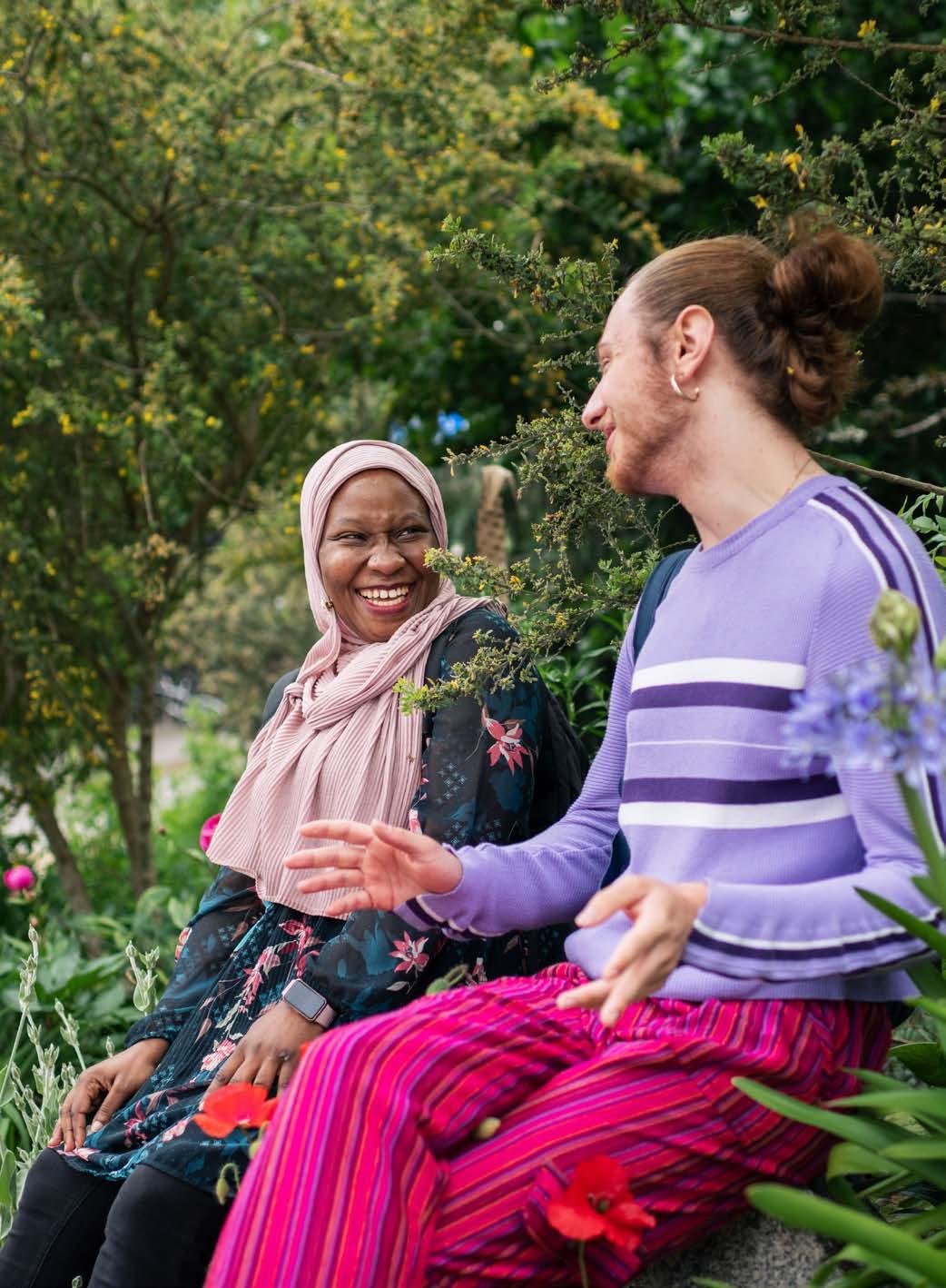
Future17 is another great example of the University’s enrichment of the curriculum. A global-first experiential learning programme in sustainability, Future17 has been developed by the University with higher education analysts QS Quacquarelli Symonds. Launched in 2022 following a successful pilot, it provides a platform for students from member universities to participate together in real-life, real-time projects focused on achieving SDGs. The programme is credit-bearing, so students are progressing towards their degree alongside solutions provision for industry.
During 2022/23, more than 300 students and around 90 academic mentors took part, working with project partners based in countries including Pakistan, the United States of America, India, Indonesia, Mali and New Zealand. Around 70 of the students were from Exeter, across the two cohorts, with 13 mentors in total.
The University of Exeter Business School joined the Global Business School Network (GBSN) this year, to further support it in addressing societal challenges worldwide through education and training. The GBSN brings together around 100 leading business schools with businesses, NGOs and governments with the aim of improving access to quality, locally relevant management and entrepreneurship education in emerging economies.
University MBA students took a deep dive into the world of circular economy as part of the cohort’s week-long corporate challenge this year. The live challenge saw the teams draw on their learning from the Designing a Better Future for All module and applying it to a real-world challenge – set by DS Smith, a leading provider of sustainable packaging solutions, paper products and recycling services in Europe and North America. The teams were asked to create re-usable packaging systems for use in e-commerce as well as for white goods, taking into account circular design strategies, the business model and the infrastructure to make it work.
Cultural and behavioural change is widely recognised as vital to achieving net zero for large organisations, particularly across scope 3 emissions. The University’s Sustainability team plays an important role in this regard, and has launched a new Communications and Engagement Strategy, which sets out how, over the next three years, it will work to improve awareness, engagement and behavioural change.
One of the key projects arising from this strategy is the Look and Feel campaign, which encapsulates a series of initiatives to raise the visibility of sustainability across all of the University’s campuses. This campaign will connect stakeholders with our sustainability strategy through innovative communication and engagement practices, including use of the arts as a channel for communication, improved digital communications, standout high-visibility events and projects, and signs highlighting best practice across campus.
The University’s Career Zone provides its students with a rich and diverse programme of extracurricular activities that enables them to develop their skills and gain valuable experience in sustainability. Green Consultants, for example, is a three-stage consultancy training programme that offers students the opportunity to gain experience working with both the University and external companies, aligned to the Sustainable Development Goals. Last year, more than 500 engaged with it and 151 fully completed the training. From there, students can progress on to working for an on-campus project, before embarking on a paid internship with one of the many commercial partners signed up to support the programme.
Grand Challenges has been running for 12 years and is open to undergraduates of all year groups across the institution via a week-long event held at the end of the academic year. Last year, 400 students took part, working in 70 groups, again, focused on the UN SDGs. Recognition of Grand Challenges success and standing in the HE sector came when the Career Zone team became the first at the University to win a Collaborative Award for Teaching Excellence from Advance HE.
EXETER STUDENT NAMED ON LIST OF 50 TRAILBLAZING WOMEN WORKING TO CREATE A BETTER WORLD
Business School graduate Selin Yigitbasi-Ducker was named on the prestigious ‘Women of the Future: 50 Rising Stars in ESG’ list published by the Financial Times. The list recognises female entrepreneurs under the age of 35 who are working to further Environment, Social and Governance (ESG) goals by making a lasting and positive impact on their organisations, environment and wider society. Selin, who graduated in 2013 with a degree in Business Management, was recognised for her start-up Goodsted, a volunteering platform which aims to affect positive change in communities.

One of the ways in which the University can benchmark its progress within the sector is through the annual league tables that measure sustainability activities. League tables such as the THE Impact Rankings offer a useful insight into how the institution’s activities – whether teaching, research, external engagement or the way it operates its campus – meet or respond to ESG challenges.
In 2022/23, Exeter’s performance in the three headline sustainability league tables demonstrated strong progress across the board.
In the Times Higher Education Impact Rankings 2023 – the only global performance league tables that assess universities against the UN Sustainable Development Goals, and which is referenced on the UCAS website under the heading ‘10 ways to choose a UK University’ –Exeter ranked 18th overall, a rise of 24 places, with an overall score of 94.5 out of 100. Within that headline score, the University:
• secured first place globally for SDG6: Clean Water and sanitation, which looks at research into water, water usage and commitment to ensuring good water management in the wider communities.
• ranked 1st in Europe (8th in the world) for SDG13: Climate Action, which measures research on climate change, a university’s use of energy and preparations for dealing with the consequences of climate change.
• placed 1st in UK, 2nd in Europe for SDG2: Zero Hunger, which looks at how various campus programmes and university-led research, innovation and business support projects are aiming to end hunger, achieve food security and improve nutrition and promote sustainable agriculture.
• ranked 3rd in UK for SDG1: No Poverty and 4th in the UK for SDG7: Affordable and Clean Energy.
• achieved global top 40 positions in six further SDGs: SDG12: Responsible Consumption and Production (12th), SDG15: Life on Land (16th), SDG14: Life Below Water (19th), SDG17: Partnership for the Goals (27th), SDG16: Peace Justice and Strong Institutions (35th) and SDG10: Reduced Inequalities (36th).

The University ranked 48th in the world in the new QS Sustainability Ranking 2023, scoring above the median in both environmental and social scores. The environmental impact category identifies whether an institution is strategising, researching, and educating with the environment in mind and the social impact category seeks to ensure social value progress alongside quality education. Within social impact, the University achieved a global ranking of 9th for Life Quality, recognising its impact for research into areas that affect health and wellbeing as well as those of other living creatures. And it also secured joint 40th position globally for Sustainable Research, relating to topics including life on land, quality education and clean water and sanitation.
The national People & Planet League is the largest student network in the UK campaigning for social and environmental justice. In 2022/23, Exeter climbed ten places to be ranked 6th in the country, placing it as the lead Russell Group member and one of the few ‘first-class universities’.
The 2022/23 league ranked 153 universities on 14 criteria including environmental policy, auditing and human resources, carbon reduction, waste and water recycling, student engagement, education for sustainable development, energy sources, sustainable food and workers’ rights. It found that 59% of universities failed to meet the target of reducing direct carbon emissions by 43% between 2005/06 and 2020/21. Exeter recorded a 45% reduction.
The alignment of the UN’s SDGs with teaching and research quality were also a feature of another, more specialised ranking this year. In the Corporate Knights 2022 Better World MBA ranking, the Exeter Business School’s MBA was named 14th in the world out of a total of 160 programmes, and fourth best in the UK.
An Environmental Management System (EMS) is a framework setting out how we protect the environment and respond to changing environmental conditions, reducing the risks and potential impacts and contributing to effective environmental governance, while supporting and influencing product and service delivery.
The University implements an EMS for Finance, Infrastructure and Commercial Services (FICS) certified to ISO14001:2015 international standard. FICS Environmental Management Policy outlines the goals, responsibilities, aims and commitments that have been adopted within the EMS to cover the activities, services and operations within FICS. It is one part of the University’s wider E&CE response and action.
The University is now working towards extending the EMS to all faculties and divisions across Exeter campuses, in support of the E&CE Policy.

Energy emissions per meter squared have more than halved across the Penryn Campus – a 55% reduction in energy and gas – based against the 2005/6 baseline. This carbon saving has been driven by the installation of PV solar panels, LED and electrical upgrades, analytics and sub-metering upgrades. Communicating energy-saving behaviours is also an ongoing campaign for the team.
Against scope 3 emissions, there have been notable successes in sustainable travel, recycling and procurement. Work has been completed, in collaboration with Cornwall Council, to install two e-bike stations. More than 570 responses were received from Cornwall-based colleagues via this years’ student and staff commuting travel survey. This information will contribute towards future campus planning and the 2030 Sustainable Travel Strategy.
Over the past 12 months, new recycling points have been established to improve waste management and recycling on campus. There are now designated recycling bins for tetra pak/cartons, food waste, vapes, medicine packaging and even Christmas decorations. The tetra pak/carton recycling has proved to be extremely popular and in the first six months of operation, more than 10,000 cartons were sent for recycling. And the Sustainability team has also collaborated with colleagues in robotics within the Games Academy who can reuse many of the batteries found in vapes.
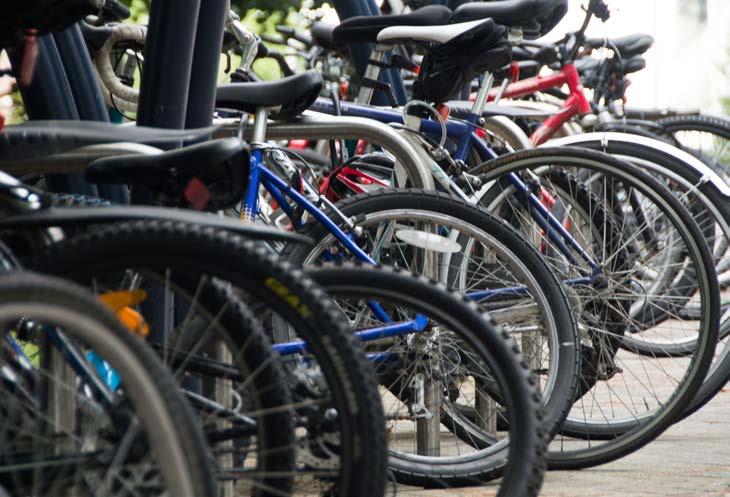
A Responsible Procurement Strategy was launched last year, which focuses on the impacts of three core areas – environmental, social and local economic factors – and on developing and embedding social value and carbon reduction initiatives within our organisation and the supply chain. The carbon reduction programme was recognised and shortlisted as a finalist at the national Go Procurement Awards 2023.
Improvements continue to be made to the natural environment on campus and the Grounds and Gardens team in Penryn has rewilded several parts of the campus through wildflower and tree planting, and invasive plant control. By establishing wildflower turf along Cornish hedges, roadsides and by outdoor seating areas, the team introduced 67 new wildflower species that will help support insect communities, such as butterflies and bees. And the mix of perennial plants that bloom in different seasons will enable students and staff to experience wildflowers throughout the year, helping to raise awareness about biodiversity and conservation on campus.
Please get in touch with the Sustainability Team to find out more about our plans to lead meaningful action on the ecological crisis and climate emergency, and how you can get involved at sustainability@exeter.ac.uk
exeter.ac.uk/sustainability